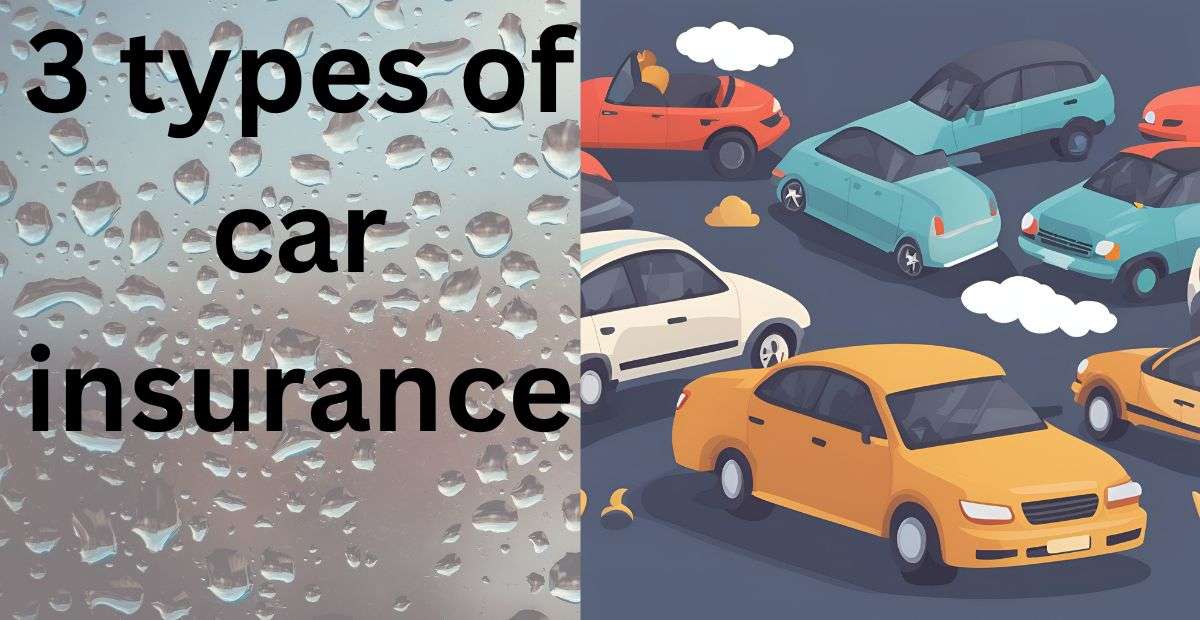Contents
3 Types Of Car Insurance
Introduction
Car insurance is not just a legal requirement but also a crucial financial safety net for vehicle owners. It protects you from unexpected expenses due to accidents, theft, or other damages. In this comprehensive guide, we will explore the three main types of car insurance: Liability, Collision, and Comprehensive insurance. Understanding these types can help you make informed decisions and potentially save a significant amount of money. With the right coverage, you can ensure your financial security and peace of mind on the road.

Table of Contents
- Introduction
- What Are the 3 Types of Car Insurance?
- Liability Insurance
- Collision Insurance
- Comprehensive Insurance
- Why These Types of Car Insurance Matter
- Financial Protection
- Legal Requirements
- Peace of Mind
- The Financial Benefits of Each Type
- Saving on Liability Insurance
- Cost-Effectiveness of Collision Insurance
- Value of Comprehensive Insurance
- How to Choose the Right Car Insurance
- Assessing Your Needs
- Comparing Insurance Providers
- Tips for Getting the Best Rates
- Common Myths About Car Insurance
- Debunking Liability Insurance Myths
- Clearing Up Collision Insurance Misconceptions
- Understanding Comprehensive Insurance Truths
- Conclusion
What Are the 3 Types of Car Insurance?
Liability Insurance
Liability insurance is the most basic type of car insurance and is mandatory in most states. It covers the costs of damages and injuries you cause to others in an accident. This type of insurance includes two main components:
- Bodily Injury Liability (BIL): Covers medical expenses, lost wages, and legal fees if you injure someone in an accident.
- Property Damage Liability (PDL): Covers the cost of repairing or replacing the other party’s vehicle or property.
Liability insurance does not cover your own injuries or damages to your car. It is essential for protecting your assets from lawsuits and significant financial losses if you are found at fault in an accident.
Collision Insurance
Collision insurance covers damages to your car resulting from a collision with another vehicle or object. Whether it’s an accident with another car, hitting a tree, or any other type of collision, this insurance helps cover repair or replacement costs. Collision insurance is particularly beneficial if your car is newer or has a higher value. While it is not legally required, it is often required by lenders if you have a car loan or lease.
Comprehensive Insurance
Comprehensive insurance covers non-collision-related damages. This includes events such as theft, vandalism, natural disasters, fire, falling objects, and animal collisions. Comprehensive insurance provides extensive coverage, ensuring that you are protected from a wide range of potential risks. This type of insurance is also not legally required but is highly recommended for comprehensive financial protection.
Why These Types of Car Insurance Matter
Financial Protection
Each type of car insurance offers unique financial protections. Liability insurance protects your assets from lawsuits and covers the costs of damages and injuries you cause to others. Collision insurance covers repair costs for your car, preventing a significant financial burden after an accident. Comprehensive insurance safeguards against unexpected events like theft or natural disasters, saving you from substantial out-of-pocket expenses.
Legal Requirements
Many states require liability insurance by law. Driving without it can result in legal penalties, fines, and even the suspension of your driver’s license. Meeting these requirements ensures you stay compliant and avoid legal troubles. While collision and comprehensive insurance are not legally required, they are often necessary to meet the terms of a car loan or lease.
Peace of Mind
Having the right car insurance brings peace of mind. You can drive confidently, knowing you are protected against various risks. Whether it’s an accident, theft, or a natural disaster, your insurance has you covered. This peace of mind is invaluable, allowing you to focus on your daily activities without worrying about potential financial setbacks.
The Financial Benefits of Each Type
Saving on Liability Insurance
Liability insurance is often the most affordable option. To save on premiums, consider the following tips:
- Shop Around: Compare rates from different insurance providers to find the best deal.
- Maintain a Clean Driving Record: Avoid accidents and traffic violations to qualify for lower rates.
- Choose Higher Deductibles: Opting for a higher deductible can lower your premium, but make sure you can afford the out-of-pocket cost in case of a claim.
- Take Advantage of Discounts: Many insurers offer discounts for safe driving, bundling policies, and other factors. Ask your insurer about available discounts to maximize your savings.
Cost-Effectiveness of Collision Insurance
While collision insurance might seem expensive, it can save you money in the long run. Repairing or replacing a vehicle can be costly, especially for newer models. Collision insurance covers these expenses, preventing a significant financial burden. To make collision insurance more cost-effective, consider:
- Assessing Your Vehicle’s Value: If your car is older and has a low market value, you might choose to drop collision coverage.
- Opting for Usage-Based Insurance: Some insurers offer policies based on your driving habits. If you drive less, you might pay lower premiums.
- Maintaining Good Credit: A good credit score can help you qualify for lower insurance rates.
Value of Comprehensive Insurance
Comprehensive insurance offers extensive coverage that goes beyond collisions. It protects against a wide range of risks, including theft, vandalism, and natural disasters. This type of insurance can save you from unexpected costs, making it a worthwhile investment. To maximize the value of comprehensive insurance:
- Evaluate Your Environment: Consider the risks in your area, such as high crime rates or severe weather, to determine if comprehensive coverage is necessary.
- Bundle with Other Policies: Many insurers offer discounts if you bundle your comprehensive insurance with other policies, such as home or renters insurance.
- Review Your Policy Annually: Regularly review your policy to ensure it still meets your needs and adjust coverage levels if necessary.
How to Choose the Right Car Insurance
Assessing Your Needs
Choosing the right car insurance starts with assessing your needs. Consider the following factors:
- Driving Habits: How often do you drive? Do you commute long distances or use your car infrequently?
- Vehicle Value: What is the market value of your car? Is it new, used, or older?
- Financial Situation: Can you afford higher deductibles, or do you need lower out-of-pocket costs?
- Personal Preferences: Do you prefer extensive coverage for peace of mind, or are you looking to save on premiums?
By evaluating these factors, you can determine the type and amount of coverage that best suits your situation.
Comparing Insurance Providers
Not all insurance providers are created equal. When comparing providers, consider the following:
- Reputation: Read reviews and check ratings from independent agencies to gauge the reliability and customer service of each provider.
- Financial Stability: Ensure the company is financially stable and can pay out claims by checking their ratings from agencies like A.M. Best or Standard & Poor’s.
- Coverage Options: Compare the coverage options and policy features offered by each provider to ensure they meet your needs.
- Price: Get quotes from multiple providers to compare rates, but don’t base your decision solely on price. Consider the value of the coverage and service you receive.
Tips for Getting the Best Rates
To get the best rates on your car insurance, follow these tips:
- Maintain a Good Credit Score: A good credit score can help you qualify for lower insurance rates.
- Bundle Policies: Bundle your car insurance with other policies, such as home or renters insurance, to get discounts.
- Take Advantage of Discounts: Ask your insurer about available discounts, such as safe driver discounts, multi-car discounts, and low-mileage discounts.
- Review Your Policy Regularly: Regularly review your policy to ensure it still meets your needs and adjust coverage levels if necessary.
- Increase Your Deductible: Opting for a higher deductible can lower your premium, but make sure you can afford the out-of-pocket cost in case of a claim.

Common Myths About Car Insurance
Debunking Liability Insurance Myths
Many believe that liability insurance covers all damages in an accident. However, it only covers damages to others. Understanding this helps you avoid underinsurance. Here are some common myths about liability insurance:
- Myth: Liability insurance covers my car’s damages.
- Fact: Liability insurance only covers damages to others in an accident you cause.
- Myth: I don’t need liability insurance if I have a good driving record.
- Fact: Liability insurance is required by law in most states, regardless of your driving record.
Clearing Up Collision Insurance Misconceptions
Some think collision insurance is unnecessary for older cars. While it might not be essential for very old vehicles, it can still provide valuable protection for mid-range cars. Evaluate the actual value of your vehicle before deciding. Here are some common myths about collision insurance:
- Myth: Collision insurance covers all types of damages.
- Fact: Collision insurance only covers damages from collisions with other vehicles or objects.
- Myth: I don’t need collision insurance if I drive an older car.
- Fact: If your car still has significant value, collision insurance can save you from costly repairs.
Understanding Comprehensive Insurance Truths
Comprehensive insurance is often misunderstood. It’s not just for expensive cars; it offers protection against various risks, making it beneficial for most drivers. Knowing its benefits helps you appreciate its value. Here are some common myths about comprehensive insurance:
- Myth: Comprehensive insurance is only for new or expensive cars.
- Fact: Comprehensive insurance is valuable for any car, as it protects against a wide range of risks.
- Myth: Comprehensive insurance covers everything.
- Fact: Comprehensive insurance covers non-collision-related damages but does not cover collision damages.
Conclusion
Choosing the right car insurance is essential for financial protection and peace of mind. By understanding the 3 types of car insurance—liability, collision, and comprehensive—you can make informed decisions that benefit you financially. Assess your needs, compare providers, and choose the coverage that best suits your situation. With the right insurance, you can drive confidently, knowing you are protected against various risks.


1 thought on “There’s Big Money In 3 Types Of Car Insurance”